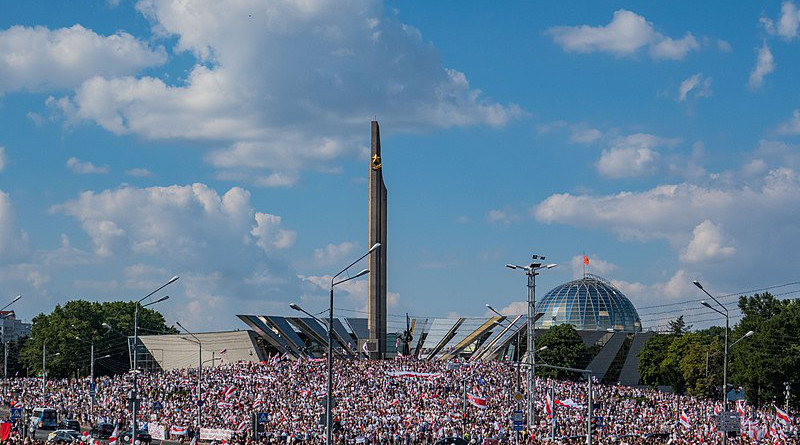Belarus: Massive Rally Calls For End Of Lukashenka’s Rule
By RFE RL
(RFE/RL) — A sea of protesters packed the streets of Minsk on August 23 for a massive rally against the disputed reelection of President Alyaksandr Lukashenka and a postelection crackdown amid a heavy security presence in the Belarusian capital and fresh warnings from the army.
The crowd, estimated at more than 100,000 people, filled the city center for what was billed as the March of New Belarus as protests entered a 15th day in the Eastern European country of 9.5 million.
The mass of protesters gathered on Independence Square, waving white and red Belarusian flags and unfurling long banners with white and red stripes.
Protesters chanted “Leave!” and “Get out!” as they called for Lukashenka to step down after 26 years of authoritarian rule.
Large protests were also held in other cities including Brest and Hrodno, as well as outside the country in Lithuania, where a 30-kilometer human chain was formed from Vilnius to the border with Belarus.
Users of network operators had problems connecting to the internet, in another attempt by authorities to clamp down on information.
By evening, people began dispersing without clashes with riot police, in the latest instance of protesters trying to end their mobilization peacefully.
The Ministry of Interior said no one was detained.
After the protest largely ended, a video posted on Telegram showed Lukashenka in a helicopter flying over the city.
“They fled like rats,” said the authoritarian leader, who was seen stepping off the helicopter at the presidential palace wearing a bulletproof vest and carrying a rifle.
Lukashenka has ordered the military into full combat readiness, raising the prospect that the army may unleash a much-feared bloody crackdown to suppress unprecedented street protests.
Describing the protesters as “fascists,” the Defense Ministry said in a statement that the memorials, specifically those dedicated to victims of World War II, must not be desecrated. The ministry warned against any violation of peace and order in such places, writing in all capital letters, “You will have the army to deal with now, not the police.”
The statement came as army personnel were spotted being transported into Minsk in military transporters, just a day after Lukashenka ordered the military to take “stringent measures” against what he described as foreign-backed plans for a “color revolution” in the country.
Protests have been taking place on the streets of Belarus since Lukashenka, in power since 1994, was declared the winner of the August 9 poll by a landslide. More than 7,000 have been detained and hundreds beaten by police. The EU and the United States have criticized the vote and condemned the postelection crackdown.
Svyatlana Tsikhanouskaya, the opposition candidate who left for Lithuania after the election and claimed to have won from 60 to 70 percent of the vote, said on August 22 that Belarusians must “struggle for their rights” and not be distracted by Lukashenka’s claims that the country was under military threat.
“We are people of Belarus and we are a majority and we will not step away. We are not afraid of them any more,” she told AFP news agency from Lithuania, where she fled following the election.
Tsikhanouskaya will meet on August 24 with U.S. Deputy Secretary of State Stephen Biegun in Lithuania, as the United States and Europe deepen their diplomatic involvement to end the crisis.
Russian Foreign Minister Sergei Lavrov on August 23 accused Belarusian opposition members who left Belarus of seeking “bloodshed,” according to the RIA-Novosti news agency.
He added that Moscow was calling for the launch of a genuinely broad national dialogue in Belarus and said Russia would accept any decision of the Belarusian authorities with regard to dialogue with the opposition.
But he said the Belarusian people “will decide for themselves how to get out of this situation.”
He also said there are “clear signs of a normalization” in Belarus, and a proposal on constitutional reform was “a quite promising path.”
The opposition this week established a coordination council to negotiate the transition of power, in a move Belarusian authorities have described as an attempt to illegally seize power.
Meanwhile, the Nasha Niva media site said the body of Mikita Kryutsov was found in a forest near Minsk with signs of multiple beatings. He was reported missing after taking part in protests in Minsk on August 12.
So far, two people have been confirmed killed in the postelection protests.

